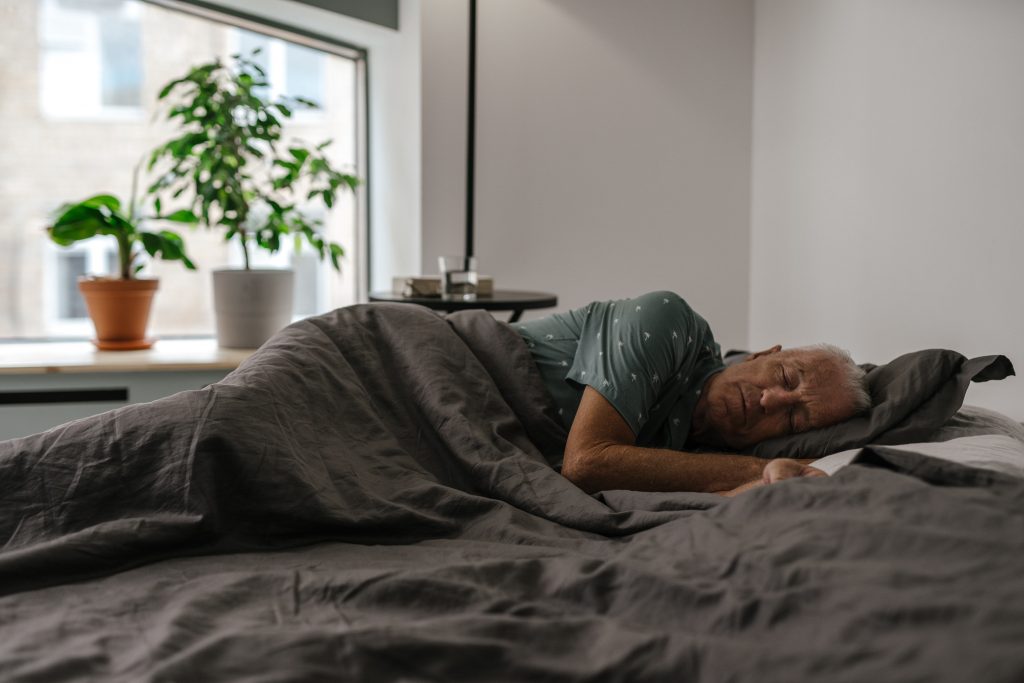In today’s fast-paced society our workplaces, schools, communities, and daily routines often become packed.
These busy schedules make it difficult to maintain healthy sleeping patterns.
Sleep plays a large role in both our physical and mental health. Despite spending a third of our lives asleep, sleep deprivation is incredibly common.
Around 1 in 3 of us will experience occasional sleep problems at some point in our lives and 1 in 10 people will be affected by ongoing sleep problems.
The importance of sleep
Sleep plays a significant role in healing and repairing blood vessels, maintaining a healthy weight and balanced hormones, and helps control sugar levels.
Sleep also affects our moods, behaviour, learning capacity, and how we interact with others.
Not getting enough sleep can limit our ability to deal with negative situations and alter our decision-making processes.

Five factors that could be affecting your sleep
1. Mental and physical health
Lack of sleep is correlated with mental health issues – problems with sleep can be both a contributing factor and a side effect of poor mental health.
Sleep problems are common in individuals who experience mental health difficulties such as depression, ADHD and anxiety.
However, it is difficult to determine exact cause and effect relationships between sleep and mental health, and research into the topic is ongoing.
Studies have shown improved quality of sleep is associated with improvements in mental health and well-being.
Poor physical health can also cause your sleep to suffer. 18% of adults said that a physical health condition or disability had negatively affected their sleep.
2. Relationships and lifestyle
A fast-paced lifestyle with constant use of technology can make it difficult to switch off at night and busy social schedules can get in the way of getting enough hours of sleep.
Caffeine and alcohol usage before bed can result in poor sleep.
The relationship between sleep and social relationships has not been fully defined but sleep quality and relationships have been shown to have a correlation.
In one study, a stable relationship history was shown to be associated with improved sleep quality and continuity. Furthermore a separate study suggests quality and presence of social relationships, especially our closest relationships play a role in sleep quality.
3. School
School is a factor that can often limit a child’s sleep, the early start times require adolescents to wake up earlier than their body clock would prefer.
Children and adolescents who achieve a recommended sleep duration may be better able to manage their emotions and report better quality of life and wellbeing.
4. Work
High work demands, job strain, level of control people have over their job, work pressure, workplace bullying, and an imbalance between effort and reward are all workplace factors that could negatively impact your sleep.
37% of working adults report their work reduces the amount of control they feel they have over their sleep.
5. Environment
Environments that are noisy and bright are linked to a lack of sleep.
Bedrooms should be kept cool, quiet, and dark to ensure good sleep.
Screen time usage before sleeping is linked to unhealthy sleeping habits and bad sleep and LED light, in particular, can lead to poor sleep.

Sleep and COVID-19
An additional factor that has been negatively impacting sleep is COVID-19. The pandemic has resulted in worsening sleep for UK adults.
Over 25% of UK adults reported COVID-19 has negatively affected how well they sleep.

Fixing your sleep
Although bad sleep is incredibly common, the principles and practices of developing a healthy relationship with sleep are simple.
- Reduce stress.
- Stress can have major impacts on sleep, practicing relaxation techniques such as breathing exercises or progressive muscle relaxation can help reduce the impacts of stress.
- Protect your sleep from lifestyle and environmental factors which could upset your sleep pattern.
- Consider reducing the intensity of aritifical light in your home and spending a couple of hours before bed without technology like your phone, laptop, or television.
- Create a time to wind down before bed.
- Avoid drinking alcohol or caffeine before bed.
- Make your bedroom more sleep-friendly
- Maintain an ambient and cool temperature (16-18°C).
- Make your room as dark as possible.
- De-clutter your bedroom for a more calming space.
- Avoid having technology in the bedroom.
- Personalise your sleep by determining how much sleep you require and what times work best for you to go to bed and wake up.
- Try keeping a sleep diary for 10 days to see what works best for you.
- Maintain a regular bedtime and sleep pattern.
- It is particularly important to get up at a similar time each day, even on weekends. This will help train your body clock to regular sleep and wake times.
- To increase your chances of getting a good sleep try to avoid napping throughout the day. If you must nap, try to keep it short (around 20 minutes).
Learn more
The National Centre for Mental Health (NCMH) offers further information about the relationship between sleep and mental health.
Episode 5 of NCMH podcast Piece of Mind: Mental Health & Psychiatry discusses sleep and if it is a cause of mental health problems or a symptom.
Listen here.
Resources
- NCMH leaflet | Sleep problems and how to manage them
- NCMH mental health leaflets
- Canopi referral form
- Canopi self-help resources
- Mental Health Foundation
- The Sleep Council
Canopi
Canopi offers access to free mental health support for health and social care workers in Wales.
Canopi is a free, confidential service that is supported by Welsh Government funding and administered through Cardiff University.

